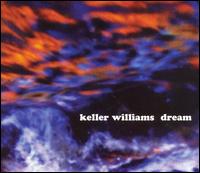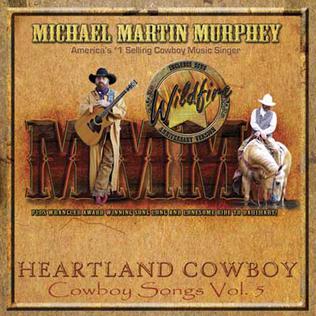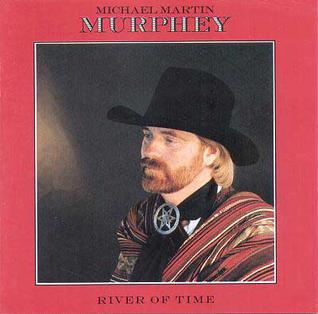
Michael Martin Murphey is an American singer-songwriter. He was one of the founding artists of progressive country. A multiple Grammy nominee, Murphey has six gold albums, including Cowboy Songs, the first album of cowboy music to achieve gold status since Gunfighter Ballads and Trail Songs by Marty Robbins in 1959. He has recorded the hit singles "Wildfire", "Carolina in the Pines", "What's Forever For", "A Long Line of Love", "What She Wants", "Don't Count the Rainy Days", and "Maybe This Time". Murphey is also the author of New Mexico's state ballad, "The Land of Enchantment". Murphey has become a prominent musical voice for the Western horseman, rancher, and cowboy.

Common Thread: The Songs of the Eagles is a tribute album to American rock band Eagles. It was released in 1993 on Giant Records to raise funds for the Walden Woods Project. The album features covers of various Eagles songs, as performed by country music acts. It was certified 3× Platinum in the United States by the Recording Industry Association of America (RIAA) on June 27, 1994, honoring shipments of three million copies in the United States. Several cuts from the album all charted on the Billboard Hot Country Songs charts after the album's release, the most successful being Travis Tritt's rendition of "Take It Easy" at number 21. Common Thread won all of its performers a Country Music Association Award for Album of the Year at the 1994 ceremony.

Elton John and Tim Rice's Aida is a 1999 concept album that contains songs with music by Elton John and lyrics by Tim Rice from the 2000 musical Aida.
The Lost Gonzo Band was an American country rock and progressive country band that was founded in 1972. The band toured and recorded with other musicians in Texas, including Jerry Jeff Walker, Michael Martin Murphey, and Ray Wylie Hubbard. They were the musicians on such albums as Murphey's Geronimo's Cadillac, Cosmic Cowboy Souvenir, and Jerry Jeff's Viva Terlingua. The original members of the band were Bob Livingston, Gary P. Nunn, John Inmon, Kelly Dunn, Tomas Ramirez and Donny Dolan. Over the years, the band has also included Paul Pearcy, Craig D. Hillis, Herbert Steiner, Mike Holleman, Michael McGeary, Bobby Smith, Lloyd Maines, Radoslav Lorković, and Riley Osbourn.

Dream is the ninth solo album from Keller Williams, released in 2007. With the help of numerous collaborators, Williams explores a wide spectrum of musical genres in each of the songs.

Heartland Cowboy: Cowboy Songs, Vol. 5 is the twenty-seventh album by American singer-songwriter Michael Martin Murphey, his fifth album of cowboy songs. The album includes the hit song "Long and Lonesome Ride to Dalhart", which won the 2006 Wrangler Award for Outstanding Original Western Composition. The album was inspired by Murphey's life on his ranch and his real experiences working as an activist and artist in American Ranching and Farming.

Geronimo's Cadillac is the debut album of American singer-songwriter Michael Martin Murphey, released on May 25, 1972, by A&M Records. Recorded at Columbia Recording Studios in Nashville and London, the album is considered one of his finest albums. The title track was Murphey's first Top 40 hit, and was also recorded by Cher and Hoyt Axton. Geronimo's Cadillac peaked at number 160 on the Billboard 200.

Cowboy Songs Four is the twenty-first album by American singer-songwriter Michael Martin Murphey, his fourth album of cowboy songs, and his first album produced by his son, Ryan Murphey. The album features a guest performance by Lyle Lovett on "Farther Down the Line".

The Horse Legends is the twentieth album by American singer-songwriter Michael Martin Murphey. This is Murphey's tribute to the horse and contains a duet with Johnny Cash on "Tennessee Stud", cover versions of Dan Fogelberg's "Run for the Roses" and Gordon Lightfoot's "The Pony Man", and re-recordings of Murphey's "Wildfire" and "The Running Blood". The Horse Legends was the last album Murphey recorded for Warner Bros. Records.

Sagebrush Symphony is the nineteenth album by American singer-songwriter Michael Martin Murphey, his second live album since his 1979 live/studio album Peaks, Valleys, Honkytonks and Alleys, and his first album with a symphony orchestra. Recorded live with the San Antonio Symphony Orchestra, this ambitious album, which presents cowboy songs and poems in a symphonic setting, contains a selection of Murphey's most popular songs, as well as traditional cowboy music. Murphey turns in "an impassioned performance" and the inclusion of guest artists Sons of the San Joaquin, Ric Orozco, Herb Jeffries, and Robert Mirabal "adds to the musical diversity and richness of the album."

Cowboy Songs III – Rhymes of the Renegades is the eighteenth album by American singer-songwriter Michael Martin Murphey and his third album of cowboy songs. The album is devoted to cowboy folklore and true tales of the West and focuses on real-life outlaws, from Jesse James to Billy The Kid to Belle Starr. Murphey performs these songs "with a scholar's eye and a fan's heart."

Cowboy Christmas: Cowboy Songs II is the seventeenth album by American singer-songwriter Michael Martin Murphey, his second album of cowboy songs, and his first album of Christmas music.

Cowboy Songs is the sixteenth album by American singer-songwriter Michael Martin Murphey and his first album of cowboy songs. The album peaked at number 25 on the Billboard Top Country Albums chart.

River of Time is the fourteenth studio album by American singer-songwriter Michael Martin Murphey. The album contains a newly recorded version of "What Am I Doing Hangin' 'Round?" and a duet with his son, Ryan Murphey, on "Talkin' to the Wrong Man" which reached number 4 on the Billboard Hot Country Singles chart in July 1988 and number 1 on the RPM Country Singles chart in Canada. River of Time peaked at number 11 on the Billboard Top Country Albums chart.

Tonight We Ride is the twelfth studio album by American singer-songwriter Michael Martin Murphey and his first for Warner Bros. Records. Released in 1986, the album was produced by Jim Ed Norman and contains guest performances by Holly Dunn, Reggie Young, Mark O'Connor, Charlie McCoy, and JD Souther. The album's title track was also its first single. The album peaked at number 46 on the Billboard Top Country Albums chart.

Flowing Free Forever is the sixth album by American singer-songwriter Michael Martin Murphey. The album establishes Murphey's love of wide open spaces and his "desire to let his soul roam freely." The album was not as commercially successful as a few of his earlier releases, but "Murphey's visions and persona remain intact." The album contains the song "Cherokee Fiddle", which was later recorded by Johnny Lee for the film soundtrack for Urban Cowboy. Flowing Free Forever peaked at number 130 on the Billboard 200.

Lone Wolf is the seventh album by American singer-songwriter Michael Martin Murphey. The album peaked at number 99 on the Billboard 200.

Peaks, Valleys, Honky Tonks & Alleys is the eighth album by American singer-songwriter Michael Martin Murphey and his first live album. The first five tracks were recorded at the legendary Palomino Club in North Hollywood, Los Angeles, an important West Coast country music venue. The remaining five tracks are studio recordings. The live tracks showcase Murphey's early work with some interesting twists. His "Cosmic Cowboy" turns into a breakdown, while "Another Cheap Western" is coupled with The Olympics' 1958 hit, "Western Movies". The album produced the singles "Backslider's Wine" and "Chain Gang" that peaked at numbers 92 and 93 on the Billboard Hot Country Singles chart respectively.

The Sweetest Days is the third studio album by American singer and actress Vanessa Williams. It was released on December 6, 1994, by Wing Records and Mercury Records. The album peaked at number 57 on the US Billboard 200 and at number 25 on the Top R&B/Hip-Hop Albums chart, and has been certified platinum by the Recording Industry Association of America (RIAA).

Motown is the sixth studio album by American singer-songwriter Michael McDonald. The album was released on June 24, 2003, by Universal Music International and Motown.



















